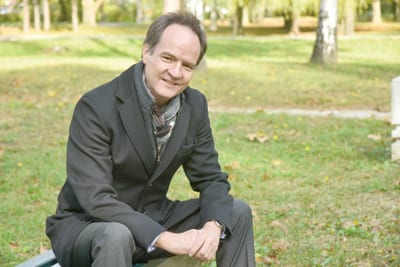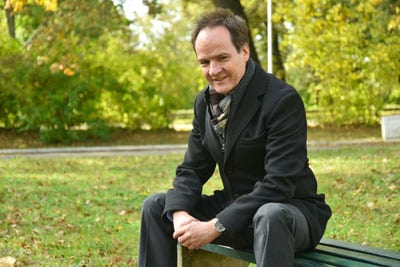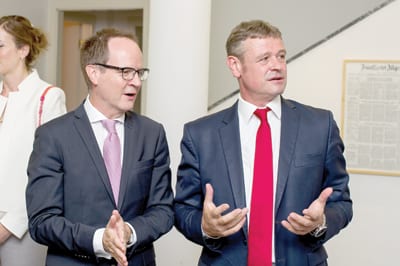The Swiss Embassy’s Cooperation Office will soon, after a promising pilot phase, launch a new €7 million programme called “Education to Employment”, the first main phase of which will cover the next four years – says Ambassador Philippe Guex
Announcing significant assistance, both in terms of expertise and financing, with which Switzerland will help in the reform of the education system in Serbia, the new Ambassador of Switzerland to Serbia, Philippe Guex, warns that success requires more than merely rewriting the experience of successful countries. It should serve as a guideline, while the success of reforms depends on the essential agreement between the private sector, the ministry of education, vocational schools and parents. They need to precisely define which task belongs to whom in this process, insists Ambassador Guex.
You are an economist with serious diplomatic experience. How do you see the region you have come to at a juncture when there is more said about tensions and harsh rhetoric than economic cooperation?
The regional reconciliation process has its ups and downs. Since this summer, we are clearly living down again. Politics is still greatly intertwined with the heavy historical heritage of the region. The good news is that regional economic integration is moving ahead, despite harsh rhetoric and tensions.
 The region has become Serbia’s second-largest foreign-trade partner after the EU and, according to the latest trade figures, Serbia has a trade surplus with Croatia for the first time since the war. Through trade and economic ties, a “silent” reconciliation process is taking place. It must be remembered that economic integration was the cornerstone of the reconciliation between France and Germany after World War II and is still at the heart of the forging of the European Union.
The region has become Serbia’s second-largest foreign-trade partner after the EU and, according to the latest trade figures, Serbia has a trade surplus with Croatia for the first time since the war. Through trade and economic ties, a “silent” reconciliation process is taking place. It must be remembered that economic integration was the cornerstone of the reconciliation between France and Germany after World War II and is still at the heart of the forging of the European Union.
It is, therefore, worthwhile underlying the initiative taken by the Chamber of Commerce and Industry of Serbia to promote trade and investment between Serbia and its neighbours, including, more recently, Albania and Kosovo. This indeed provides a substantial contribution to this “silent” reconciliation process. However, recent political tensions remind us that regional political stability cannot be taken for granted. There is still a lot to do ahead of us.
Serbia and Switzerland are both confronted in various ways by the migrant crisis. Swiss citizens voted in a referendum to give approval to the authorities to step up surveillance and monitoring systems, in an effort to prevent terrorist actions. How much has the threat of terrorism in your country changed the way of life and the thinking of citizens?
The new Swiss law you are referring to is aiming at giving new powers to the police and intelligence services to cope with the new challenges resulting from radicalisation and religious extremism, primarily with the rationale of prevention since the threat of terrorism remains – in comparative terms – relatively low in Switzerland.
This is in part the result of Switzerland has so far been able to prevent the “ghettoization” of Muslim minorities. It also reflects Switzerland’s multilingual and multi-confessional structure, as well as a long tradition of immigration. With one-quarter of its population being foreign, Switzerland actually hosts one of the largest foreign populations in Europe.
Migrants are not only contributing significantly to both our diverse social fabric and to our prosperity, but they are also needed when one considers our ageing demographic structure.
The number of Swiss companies in Serbia has been growing continuously and now exceeds 200. These companies employ close to 10,000 people
Could the threat of terrorism jeopardise the multiculturalism and respect for differences that are characteristic of Swiss society, and could it strengthen extreme right-wing political options?
I do not believe that Switzerland’s multiculturalism and respect for differences can be jeopardised by the threat of terrorism – Switzerland lies at the centre of Europe and has always been, and will remain, a hub for people of diverse origins and backgrounds. Of course, like in the rest of Europe, the menace of terrorism undoubtedly feeds populism and xenophobic movements.
However, at our latest referendum, held on June 2016, Swiss voters backed government plans to provide for faster and fairer asylum procedures, despite right-wing and anti-immigration parties opposing the proposed amendments to Swiss asylum legislation.
Is there justification for the prognosis that signing the agreement with the EU that will increase the transparency of cash flows and strengthen the prevention of tax evasion will lead to Switzerland possibly losing its status as a financial hub for the world’s richest people?
The same question was asked to me already in 1989 when I was a young diplomat. The G7 heads of state had just decided at their summit in France to seriously fight against money laundering. As the Swiss government decided right from the start to join the efforts of the G7, most observers then predicted the end of the Swiss financial centre. For almost 30 years, Switzerland has been complying with all kinds of new international regulations promoting financial disclosure, determined by the EU, OCDE, G8 or G20.
As an example, no other financial centre in the world has returned as many spoiled assets acquired by corrupt potentates as Switzerland has done in the last 20 years (1.8 billion dollars). Despite these new disclosure and transparency regulations, Switzerland today remains inundated by foreign capital in search of safe havens. To stem the appreciation of the Swiss franc, the Swiss Central Bank has since 2014 been imposing negative interest rates on banking deposits.
Switzerland has a long and strong tradition of political and military neutrality. However, the country finally opted to join the United Nations in 2002, and the Schengen Agreement in 2005
So you are saying that efforts to prevent tax evasion are not having any impact on Switzerland as a financial centre?
No. What I am saying is that the business model of the Swiss financial centre is actually adapting to the new international standards. For some banking or financial firms, this has proven very painful. Some had to close, others had to merge. And this restructuring process will remain a challenge for many of them in the years to come. But the net inflows of foreign capital remain high and – even if the margins of profit have decreased – the competitiveness of the Swiss Financial Centre remains world-class. And I do not see why this should change. At the end of the day, it is the quality of the financial service provided which makes the difference.
Serbia is highly dependent on foreign investment. To date, 200 Swiss companies have invested in the Serbian economy. Do you see areas in which this cooperation could be advanced?
The number of Swiss companies in Serbia has been growing continuously and now exceeds 200. These companies employ close to 10,000 people. This is also reflected in Switzerland has consistently ranked among the top ten foreign investors over the past decade. Swiss investments in Serbia are very diverse, ranging from food production, agriculture, pharmaceuticals, retail, recycling, construction, metallurgy, machinery, ICT, the aerospace industry, transport and logistics, as well as services. There are encouraging prospects for further Swiss investments in Serbia, especially in the software and ICT sectors, as well as in the mechanical and wood processing sectors.

This cooperation could be further advanced by providing incentives to the Serbian diaspora in Switzerland, considering that remittances sent to Serbia last year amounted to 430 million euros, which is 15 per cent of the total amount of remittances (2.86 billion euros) that comprise 8.5% of Serbian GDP.
At the same time, attracting further investors, including from the diaspora, will require improving businesses’ legal security, easing their access to finance and ensuring the efficient and transparent implementation of tax legislation. Giving the judicial authority the means and powers to prosecute corruption cases more efficiently would clearly improve the business climate for foreign investors. Improvements are also required in the education system. Companies in non-IT sectors, for instance in industrial production, certainly face difficulties when it comes to finding a skilled workforce.
Some 30 projects supported by the Swiss government are currently being implemented in Serbia and are directed towards the economy, strengthening the system of good governance and energy efficiency. Do you intend to also get engaged in other areas?
After the European Union and Germany, Switzerland is the third bilateral donor in Serbia. The focus my country is giving to Serbia also has to do with the large Serbian diaspora living in Switzerland, which contributes substantially to its economic prosperity and its multi-ethnic society.
Switzerland’s current Cooperation Strategy in Serbia actually focuses (1) on the development of a competitive economic and private sector, including by supporting innovation and entrepreneurship; (2) on the strengthening of local governance, as well as (3) on energy efficiency and renewable energies. These are areas where Switzerland has specific expertise and successful experiences. Next year, a new Cooperation Strategy will be elaborated to revise and align our support to Serbia for the next four years.
The Swiss Cooperation Office of the Embassy will, after a promising pilot phase, shortly launch a new €7 million programme called “Education to Employment” (E2E), the first main phase of which will cover the next four years
As an illustration, we shall continue supporting Serbia in reforming its dual education system, which combines education at school with training on the job in a company. This is meant as a contribution to tackling the high unemployment rate of the youth in Serbia and, by so doing, supporting the Government’s efforts to improve social cohesion and strengthen sustainable economic policies. In general terms, Switzerland’s Cooperation Policies do have positive track records on promoting the social inclusiveness and integration of vulnerable groups.
There has been a lot of talk in Serbia recently about dual education, with Switzerland, alongside Austria and Germany, mentioned as a country that should serve as a model for the reform of the education system here. The academic community in Serbia has not made it completely clear why this model is now offered as the optimal solution for a large number of unemployed citizens among young people?
My mother was desperate when I told her at the age of 15 that I did not want to enter dual education, like two-thirds of Swiss pupils, but rather wanted to go to college to get a baccalaureate. This personal example shows how the dual education system is positively regarded in Switzerland as providing solid and well-paid jobs to young people once they get their certificates. And if my country has one of the lowest rates of youth unemployment on the planet, that is mainly due to dual education.
There is no worse policy than a “copy-paste” policy. Therefore, a model coming from another country (be it Switzerland, Austria or Germany) must remain a source of inspiration only, given that educational institutions and economic realities are different in Serbia.
For this reason, we have given our support to the Regional Development Agency VEEDA from Vranje, which has brought together the main actors of the furniture industry, comprising seven furniture companies from Southwest Serbia (Užice, Ivanjica, Arilje, etc). These companies have together defined customised curricula with the Technical school in Užice and opened their doors for practical training to pupils three days a week.
This model has been received with interest by the Ministry of Education. This shows that this model can be a first step for offering a good professional education and job opportunities to young people. A similar initiative was recently launched in the tourism industry by the Zlatibor Regional Development Agency, another of our partners.

Our assessment is that the Serbian government is firmly willing to reform the education system. Prime Minister Aleksandar Vučić and Swiss President Johann Schneider-Ammann have exchanged their points of views on the matter on several occasions, including last June at the International Congress on Vocational and Professional Education in Winterthur (Switzerland).
We are ready to support education reform in Serbia by making our expertise available to all stakeholders. With this aim, the Swiss Cooperation Office of the Embassy will, after a promising pilot phase, shortly launch a new €7 million programme called “Education to Employment” (E2E), the first main phase of which will cover the next four years.
What do you think of the warning that insisting on a dual education system in conditions of an underdeveloped economy actually only serves to create cheap labour rather than directing young people towards acquiring know-how in the fields of the future – the IT sector, the sector of innovation and high technology?
This could indeed happen, which is why special precautions need to be taken in order to avoid that. Namely, the model of private-sector responsive education is working in cooperation with Serbian companies, local technical schools and the Ministry of Education. Before education starts, companies, technical schools and parents agree on a set of conditions which each of the parties needs to fulfil.
Once the pupils complete their education, they have different options: seek a job as skilled employees, start their own business as individual entrepreneurs, or continue with their education at a higher level. At the same time, we also back on high-tech development.
In early December, I will organise a Belgrade event of the “Musée du Point de Vue” (the Point of View Museum), the only museum in the world which has nothing to show, but the opening reception of a non-exhibition
Most recently, the Swiss-supported Science and Technology Park Belgrade has started to cooperate with the Faculty of Mathematics in Belgrade, with a view to matching high education with the private sector’s needs following an innovative approach. Concretely, the Technology Park is working on introducing an entrepreneurial way of thinking in the official curricula of the Faculty.
Your predecessor insisted on helping young artists in Serbia through a fund established through the embassy. Do you intend to continue being engaged in the field of cultural exchanges and assistance to talented young people?
Contemporary art is nothing new to me. In the late 1990s, I was the chairman of Fri’Art, a contemporary visual art centre in my home town of Fribourg, Switzerland. Today I still chair an association of artists called “Charlatan”, which promotes interdisciplinary dialogue among creators.
In early December I will organise a Belgrade event of the “Musée du Point de Vue” (the Point of View Museum), the only museum in the world which has nothing to show, but the opening reception of a no exhibition. It forces us to think about what art really means today. The opening reception will take place on the roofs of Belgrade: a point of view from the Sava to the Danube and beyond. Moreover, one Belgrade artist will spend a month at the end of the year in the Swiss capital of Bern via an artist in residence exchange programme.
As such, there is no doubt that I plan to continue promoting cultural exchanges between Switzerland and Serbia, considering that people-to-people exchanges remain the backbone of our bilateral relations. And I shall also endeavour to continue encouraging talented Serbian artists, especially in the field of contemporary art. I am convinced that whilst Belgrade is a regional hub, it has the potential to become a European hub.
In the last fifteen years, Serbia has gone a long way towards becoming a vibrant, modern and dynamic society, integrating the European values of freedom and respect for diversity. That’s why I consider investing in contemporary art as part of Switzerland’s necessary contribution to further invigorating creative forces in Serbia and supporting the Serbian society as it moves forward.